- Home
- Helen Humphreys
The Lost Garden: A Novel Page 4
The Lost Garden: A Novel Read online
Page 4
8
Dear Mrs. Woolf.
Of your books, I must say that I like To the Lighthouse best of all. It is a perfect garden. The right mix of order and chaos. I admire (No) I love how the lighthouse, always in the background of the story, is to some extent Mrs. Ramsay herself. How the strokes of light are part of the emotional rhythm of Mrs. Ramsay.
I would say (No) Is it true, perhaps, that this book is really about the haunting of memory? This is also what makes it a perfect garden because that’s what flowers are sometimes to us, ghosts.
Did you once walk through Tavistock Square, seven years ago now, in June? This is what haunts me. And now that you are lost. (No) Now that you’ve gone missing, I might never know your answer.
I liked in To the Lighthouse that the big questions Mr. Ramsay asked, about art and civilization, were directed to the escallonia hedge.
But I am thinking now of Tavistock Square, of London. I cannot go on with this letter in my head, this endless letter I go on thinking up and never actually send. And why do I continue to do this when the person to whom I would send it is perhaps not even still living? Habit? Need? Because it links me to that night in June seven years ago, when there was no war, when all the buildings were still in place on my particular route through the city. How I would link London up for myself as a series of green squares on the way to the river. Sunlight on grass. The white stone of the city churches against the night sky. Like bones, I could say they were like bones. I could say the city was a body I pressed to mine. The fine hair of the tall grasses in Highgate Cemetery. The smell of the river. That world as it was, that I will never inhabit again.
9
I locate the letter from the Women’s Land Army head office as I’m putting my books and clothes away in my new room. When I open it and read through it, I find that the mistake has all been mine. I was meant to have arrived at Mosel a week ago. Somehow I had muddled the date. No wonder there was no one to meet me at the station.
I sit down on my bed, the letter in hand. How could I have been so foolish? All the disorganization of today is my fault and could have been avoided.
“Why are you such an idiot?” my mother used to say to me when I’d failed to grasp some adult nuance. It always felt like such an unfair question. If I was such an idiot, how would I be able to answer that?
I had wanted a new start. I had wanted a return to gardening. I had wanted to be useful and liked for what I knew. Now I had ruined my chances before I’d even begun. I crumple up the letter and hurl it at the wardrobe.
Outside the air is cool, prickles a little on my skin as I walk out into the quadrangle. No wardens here. No screech of bombs, clatter of bricks falling. I tilt my head back to see the stars, but the gesture makes me feel so lonely I almost start to cry. “Idiot,” I say, instead. “You’re such an idiot.”
I walk slowly along the gravel path that borders the quadrangle. It has been so long since I walked anywhere at night with such ease of purpose. If I was in London walking at night, in these days of the Blitz, I would, at some point, have to hurl myself dramatically down some shop’s cellar stairs, or scurry home to burrow under Mrs. Royce’s dining table.
As I walk around by the stables I hear a noise. It’s a noise I unfortunately recognize from Mr. Gregory, whose room next to mine on Denbigh Street was separated only by a regrettably thin wall. I push open the stable door and see them lying on the straw. They are thankfully both still dressed. “What are you doing?” I say loudly, even though it is perfectly clear what it is they are doing.
There is a mad scramble and they unexpectedly shoot past me, clutching their undone pieces of clothing to their bodies. The soldier. The Land Army girl. In the darkness I can’t get a good look at the girl as they’re now running across the quadrangle. The worst thing of all is that they’re laughing. I close the stable door firmly behind them. I would lock it if I could, but there’s no lock.
I continue my walk around the quadrangle. I feel too shaken to go back to my room and don’t know what else to do. After my third time around the courtyard I tire of this and head out into the darker surround of the kitchen garden. I run my hands along the brick wall beside me, remembering how I felt my way along Denbigh Street one night when there was no moon. House to house, each dark stone smooth under my hand, until I reached the iron railing that bordered Mrs. Royce’s house. How I never turned a light on once inside, felt my way up the staircase to my room, undressed in the dark, slid into bed—as though the whole journey was the same moment, extended and unbroken. It is light that dismantles each moment, I had thought then. Light proves it one thing or another. Darkness does not judge.
I have reached the end of the garden wall. Just as I turn the corner to continue walking around the wall there’s a scream. A young woman materializes ahead of me in the darkness.
“What?” I say. The scream has startled me and I stub my hand against the bricks. It is a Land Army girl. I can’t tell if it’s the same one I just caught in the barn with the soldier or a different one altogether. She’s rushing towards me. “What is it?” I say, and she stops.
“There’s something out there.” She’s a little breathless.
“What sort of something?”
“A ghost,” she says. “All white and misty and moving quickly between the trees.”
“There can’t be a ghost,” I say, but she’s not really listening to me any more. Her fear has propelled her past me and she rushes off towards the buildings.
I do not believe in ghosts. It’s more likely that the foolish girl spotted another Land Army girl skulking through the woods. They seem distressingly nocturnal, these girls. Just to set my mind at rest, I continue along the length of this wall, out to the place where the trees begin, and I stand very still, peering into the darkness. Nothing. No movement. No sound. No ghost, I think, and turn back for the quadrangle, satisfied in my belief that there is only this world and nothing beyond it. But I have never been more wrong.
The next morning I walk back over the cobblestones, under the arch, and onto the driveway that leads up the hill to the big house. I am relieved that the house is further away than I’d thought. It is at least a mile distant and I am glad it takes me so long to reach the circular drive. Even with Doris’s shortcut, the girls couldn’t be dashing up here every five minutes, as I had feared they might do. I remember last night and reprimand myself for wishful thinking.
The house is large and made of grey stone. It looks to be eighteenth century, with its strict proportions—three generous windows each side of the front door and the upper-storey windows aligned with these. Three dormers in the roof, and the house flanked by two enormous chimneys.
Framing the massive front door are a pair of concrete urns. Nothing is growing in them, and a soldier leans up against the left-hand one. He has his eyes shut.
“Excuse me,” I say, and he opens his eyes but doesn’t get up. He probably thinks I’m a local woman, sent to clean the house. I bristle at this, and I don’t like the way he looks at me.
“I’m here to see your CO,” I say, with all the imperiousness I can muster. “Would you be so kind as to inform him that Gwen Davis of the Royal Horticultural Society is here.”
The soldier is not impressed. “He’s in the drawing-room,” he says. “Go on, then.”
“I have no idea where the drawing-room is.”
The soldier sighs and rises slowly to his feet. “All right, ma’am,” he says.
The house is infinitely grander than our quarters. Crystal chandeliers. Polished mahogany. Passing the dining room I can see a sideboard gleaming with silver serving dishes. Our food last night was served on chipped plates. Our silverware is tarnished. Amid the stately features of the house, evidence of its new inhabitants. A row of heavy boots in the foyer. A rucksack on the piano bench.
I follow my reluctant guide to the back of the house, to a drawing-room that overlooks the garden. Standing there in front of a gramophone playing what sounds like Mozar
t is the handsome man from the train station who gave me a ride to Mosel.
“Captain Raley, ma’am,” says the soldier, and he disappears back up the hall.
“You?” I say. “You’re the CO?”
As the man turns to me, he lifts the needle from the spinning record. “Hum that,” he says.
“What?”
“Hum what you just heard.” He looks at me intently and I warble over what I think were the last few bars of the piece. “God,” he says, stepping away from the gramophone as though bitten. “That was truly awful.”
“Well, I didn’t come up here to hum,” I say, working myself back up into a huff.
“No, of course not.” Raley steps up to the gramophone. He places the needle carefully on the record and the music moves into the space between us. We don’t speak. Then he lifts the needle again and the music disappears. “Mozart,” he says. “The Requiem, even. But gone nonetheless. Completely gone. The air is not altered by it. Music is not rain, as the poets insist, because when it rains you can tell that it’s rained. With music, there’s nothing to show accurately that it was even here.”
“There’s us,” I say. I clear my throat, but I’m not brave enough to attempt humming again.
Raley looks at me. “It’s temporary,” he says. “The effect on us.” He turns the knob on the gramophone and the record stops spinning.
“Well, aren’t we temporary also?” I say. I realize, after I’ve said this, that it is not the right sort of thing to say to a man waiting to be posted into the war. His face suddenly looks all hollow and sad. “Sorry,” I say. “I’m always saying the wrong thing. I’ve spent too long working alone in a laboratory.”
“Doing what?”
I think of the neatly labelled row of gangrenous parsnips. “Don’t ask,” I say. “It wasn’t good.”
Raley moves away from the gramophone, and the light from the French doors behind him rests on his head and makes him look otherwordly. “Would you like some tea?” he says, and I follow him into the kitchen.
He heats the kettle on the cooker, makes the tea, and we sit down on opposite sides of the big kitchen table. The early-morning sun makes a bright pattern on the surface of the wood. I have come up here before the Land Girls were out of bed, dressing in my new clothes, sneaking out undetected. “I have come here to see you,” I say, “because it appears my girls have been spending time with your men.” Understatement, I think, remembering last night.
“Your girls?” Raley smiles at me. “You? You’re the CO?”
I couldn’t feel less in command, but I did accept the weight of responsibility. Volunteered, I think bitterly. I volunteered for it. “For lack of a better term, I’m the CO.” The sun is heating up my green jersey and making me feel itchy.
“I see,” says Raley. “You think our two groups of soldiers should stop fraternizing with one another?”
“Yes. We all have our work to do. We should just get on with doing it.”
“But we are waiting to begin our work.” Raley leans across the table towards me, his face suddenly serious. “And the beginning of our work could essentially mean the end of our selves. Is it reasonable to expect such restraint from men faced with death?”
I can see how cruel it is to wait here in this beautiful grand house, on this gorgeous estate, to wait here to be sent into the war. The contrast will be so extreme. Better to have waited in a roadside shack or a makeshift shelter in the woods. “Is the waiting unbearable?” I ask.
“Yes,” says Raley. “And no, considering the alternative.” He settles back in his chair, a skitter of worry across his handsome face. If he were a flower, he would be something magnificent. A giant indigo-blue delphinium. A flower that knows, and practises, how to be in love with itself.
“You know how it is, Commander Davis,” he says. “What is outlawed becomes desirable. Forbidden fruit and all that.”
I have a sudden and terrifying image of a smiling, naked Roy Peake, arms outstretched, and sitting in the palm of each hand a perfect specimen of his Unknown Pear.
“What about a regular, organized event like a dance?” continues Raley. “Say, once a week, here at the house?”
I don’t say anything for a moment or two, let him think I’m giving it my deepest consideration, but I have been swayed to sympathy by his mention of death, and by the sight of him in the drawing-room with the sun tangled in his hair. War, too, is order and chaos. But the actuality of the war itself is only chaos. “Every two weeks,” I say. “And we can alternate the location. We have a large dining hall which would be quite suitable for dancing.” At least I’ll be able to keep an eye on the girls at an organized event. It won’t be as easy for them to sneak off with the soldiers.
“Yes, that’s right. I had a good look around down there before you all arrived.” Raley puts both his hands around his tea mug, looks into it. “In fact, I almost set fire to the place. Lay down in one of the rooms with some candles burning. I woke up and the timbered arch above my head was on fire. A long, shivering halo of flame. I barely got it out with the blankets.”
“I know that room. That’s my room.”
“Is it?” Raley looks up at me in surprise. “Well, fancy that.”
Last night I couldn’t get to sleep for a very long time. I lay there in the dark, making up letters to Mrs. Woolf, and all the time smelling the fiery char of the room. At one point it was all I could think of. I lay there and imagined myself as the smoke, brushed invisibly onto every surface of the room. Even words and thoughts must be coated in it.
Raley gets up to fetch us more tea. “Do you want to know something funny?” he says. He’s pouring out the tea, his back to me. The muscles in his forearm are thick and ropy as a tree root.
“What?” I say.
He hands me my refilled mug of tea, doesn’t sit down at the table, but stands beside me instead. I can’t see his face unless I look up. His voice sounds very far away, as if he’s in a different place from me altogether. “When I was lying in that room, sleeping, and the candles were setting fire to the wood above my head, I was dreaming, such a clear and vivid dream.”
“What of?”
“Roses.” Raley moves away from me, towards the window. I can’t see him at all now. “I was dreaming of a great tangle of roses, and when I woke, the first thing I saw was roses. That wooden arch above my head was a bower entwined with roses. A mass of roses. All on fire.”
10
Ever since Jane made that remark at dinner about the Land Girls being akin to potatoes, this is how I have thought of them. I can’t be bothered to learn their real names, but I have given each of them the name of a potato. Doris, I have rather unkindly called “The Lumper.” The girl with reddish hair I have nicknamed “Golden Wonder.” The two who seem the least amenable, and who have potential for disobedience, I have named “British Queen” and “May Queen.” The black-haired girl is “Vittelette Noir” (“Vittelette” for short). The one who seems the most unhappy, has a constant downcast expression, has been called “Salad Blue.” I have given her the name of what is perhaps the most interesting of all the potatoes, in that it retains its entirely blue flesh even when cooked.
Jane has remained Jane. She seems well apart from the potatoes, both in body and in spirit.
I have rushed back from my meeting with Raley to find the Potatoes waiting for me inside the walled garden. No one looks overjoyed to see me. “Right!” I say, with as much enthusiasm as I can summon. “Glad to see you’re all eager and ready to go.” No one looks eager. “Potatoes,” I say, and almost laugh. “That’s what we’re here for.” I look out at the weedy, untidy vegetable garden. This is where we’ll have to start. I need to survey the whole estate and look for other suitable places to grow potatoes, but for now it’s best to begin where vegetables have previously been grown, in this kitchen garden. “Weeding and hoeing. Cleaning this mess up ready for seeding,” I say. “Organize them,” I say to the Lumper, who’s standing beside me. “I’ll be ba
ck in a bit to check on your progress.” I stomp off in my over-large wellington boots. As I go through the garden gate I hear Doris say in a quavery voice, “Do any of you feel like weeding?”
I find Jane in the barn just off the main quadrangle. She’s mucking out the cows. “I want to buy some chickens,” I say. “Where’s the money?”
“God, Gwen.” Jane visibly jumps at my request. “Don’t sneak up on me like that. I almost stabbed myself in the foot.” She leans on her pitchfork. “What did you say?”
“Chickens. I want some. There’s a run in the garden. We can have our own supply of eggs—rationing be damned—and they can eat the garden waste. A very economical solution all round.” I am pleased with my sudden decision.
Jane lights a cigarette. “They warned me about chickens,” she says.
“Who?”
“The people who own this place. When they were leaving the instructions for the animals’ care. Don’t be getting any chickens, now—that’s what they said.”
“Why ever not?”
“There’s a ghost that takes them.”
“A ghost? What would a ghost want with a chicken?”
Jane grins at me. “You get so indignant,” she says. “I’m just telling you what was told to me.”
“But you can’t believe it? Ghosts?” I remember the girl, who I’ve since decided was Golden Wonder, rushing at me through the darkness last night, convinced she’d seen a ghost.
“No, I don’t believe in ghosts, even though I’ve known a worthy candidate.” Jane puts a hand on the flank of the cow nearest to her.

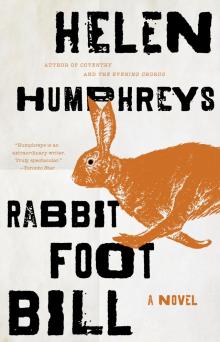 Rabbit Foot Bill
Rabbit Foot Bill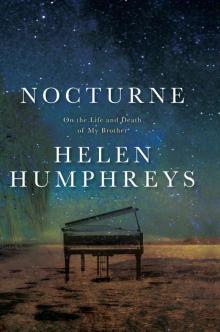 Nocturne
Nocturne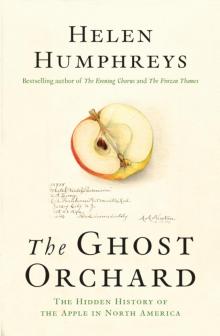 The Ghost Orchard
The Ghost Orchard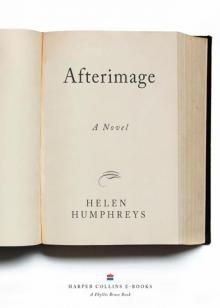 Afterimage
Afterimage The Frozen Thames
The Frozen Thames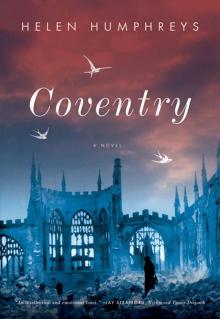 Coventry: A Novel
Coventry: A Novel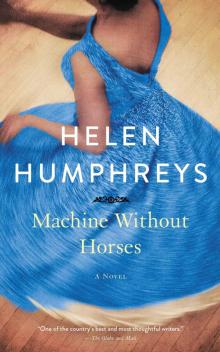 Machine Without Horses
Machine Without Horses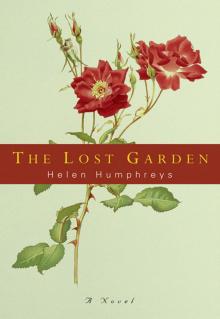 The Lost Garden: A Novel
The Lost Garden: A Novel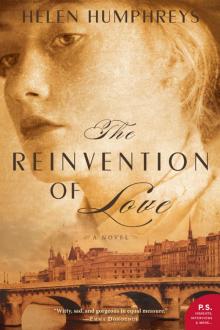 The Reinvention of Love
The Reinvention of Love Helen Humphreys Three-Book Bundle
Helen Humphreys Three-Book Bundle